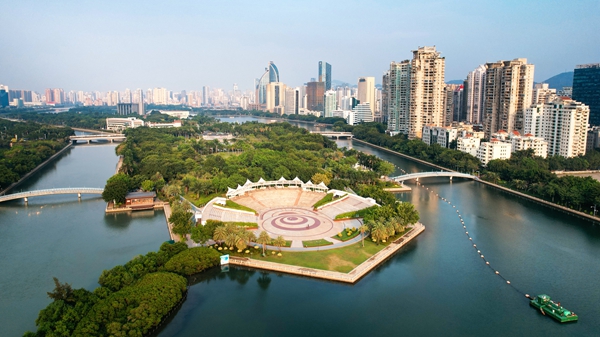

An aerial panoramic drone photo shows Yundang Lake and its surroundings in Xiamen, East China's Fujian province. [Photo by Lin Yuyang to chinadaily.com.cn]
Lake restoration in Xiamen, Fujian province, can offer guidance in the coordination of high-quality development and high-level protection of the marine environment, officials and experts said.
High-level protection is a crucial pillar for high-quality development, and the comprehensive restoration of Yundang Lake in Xiamen has prioritized ecological preservation and low-carbon development, Minister of Natural Resources Wang Guanghua said at a recent conference in Xiamen.
Yundang Lake, once a bustling natural harbor, was turned into a lagoon in the 1970s because of land reclamation and embankment construction, reducing its water area from 10 square kilometers to only 1.6 sq km.
In the early 1980s, intensified construction projects and a surging population exerted mounting environmental pressure on the lake, resulting in turbid water and unpleasant odors. More than 100 factories directly discharged wastewater into the lake.
A turning point came in 1988, when the city proposed strengthening legal protection, ceasing pollution, dredging and reconstructing the banks, revitalizing the water body, and enhancing the surrounding environment.
Xiamen's progress in restoration efforts has seen the city dubbed "a garden above the sea", and it has gradually established a comprehensive management and technological support system for the marine environment.
High-level protection has also resulted in high-quality development. Thirty-six years of ecological efforts in Xiamen have yielded substantial scientific achievements in various fields, such as the high-tech marine industry and marine carbon sequestration.
Xihu Lake in Fuzhou, Fujian's capital, took the lead in the wider adoption of Xiamen's comprehensive restoration approach to safeguard water quality, biodiversity and people's well-being.
The area around the lake, one of Fuzhou's eight major historical and cultural scenic attractions, is the city's oldest and best-preserved ancient garden.
However, industrialization and urbanization in the 1980s presented the lake with a challenge akin to that faced by Yundang Lake.
Fuzhou has been practicing water management since the 1990s, and the shift from labor-intensive methods to the use of mechanical equipment enhanced the effectiveness of restoration efforts. However, the focus at that time was on dredging rather than tackling the root cause of the pollution — the escalating discharge of wastewater from surrounding factories and residential areas.
The pollution issue in the lake was not addressed until later that decade, when the city proposed a comprehensive approach incorporating dredging, ceasing pollution, water diversion and management.
Similar to Xiamen, Fuzhou has linked the lake to the sea, transforming stagnant water into a dynamic ecosystem and fostering a healthier aquatic environment.
Many cities outside Fujian, such as Wenzhou in Zhejiang province, Beijing, and Fangchenggang in the Guangxi Zhuang autonomous region that are also promoting high-quality development in tandem with environmental protection, vowed at the conference to incorporate ecological restoration in their urban development planning.
The ecological rehabilitation of Yundang Lake was showcased as a prime example of China's ecological restoration efforts during a meeting of parties to the United Nations Convention on Biological Diversity in 2021, and Xiamen's approach has been extended to more than 100 developing countries.
China has launched a new pilot program to allow eligible enterprises greater access to overseas financing in support of green and low-carbon transformation projects, the country's foreign exchange regulator said on Aug 21.
To further streamline the experience, China is expanding tax refund stores, broadening the range of refundable goods, and refining refund procedures, ensuring an efficient and seamless shopping experience for global visitors.